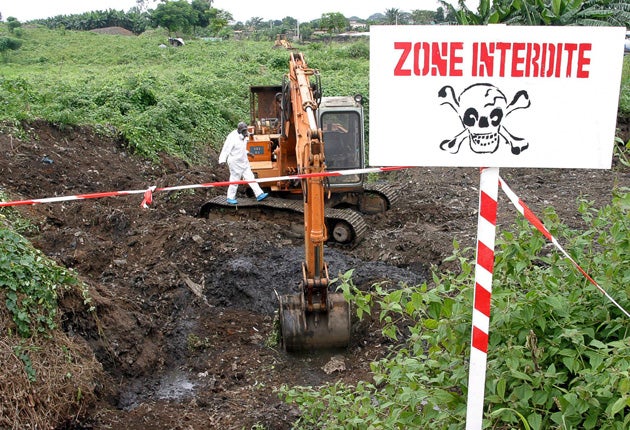Threat to toxic waste victims' compensation
Court orders law firm to relinquish £30m paid by Trafigura

Your support helps us to tell the story
From reproductive rights to climate change to Big Tech, The Independent is on the ground when the story is developing. Whether it's investigating the financials of Elon Musk's pro-Trump PAC or producing our latest documentary, 'The A Word', which shines a light on the American women fighting for reproductive rights, we know how important it is to parse out the facts from the messaging.
At such a critical moment in US history, we need reporters on the ground. Your donation allows us to keep sending journalists to speak to both sides of the story.
The Independent is trusted by Americans across the entire political spectrum. And unlike many other quality news outlets, we choose not to lock Americans out of our reporting and analysis with paywalls. We believe quality journalism should be available to everyone, paid for by those who can afford it.
Your support makes all the difference.More than 30,000 victims of toxic dumping on the west coast of Africa may never see a penny of their compensation, British lawyers have warned, after they lost a crucial battle in the courts of Ivory Coast.
Residents of the city of Abidjan were awarded £30m after an international trading company agreed to settle compensation claims for sickness, vomiting and other minor illnesses.
But yesterday judges sitting in the Court of Appeal of Ivory Coast ordered the UK law firm Leigh Day & Co to relinquish all £30m paid by the company, Trafigura, which admitted hiring a subcontractor to dispose of the waste. The judges ruled that all the money must be transferred to the bank account of Claude Gouhourou, one of the 50 or so representatives of the many communities in Abidjan affected by the toxic waste.
Martyn Day, a senior partner at the UK law firm Leigh Day & Co, which helped the claimants win the compensation, described the decision as "very worrying". He said: "In 30 years of practice I cannot remember a more depressing court decision. Thirty thousand Ivoirians have been looking to get the compensation due to them to alleviate their lives. Now there is a very real chance they will not see a penny."
He added: "We have and will continue to leave no stone unturned in this battle to try and ensure our clients receive the justice we have fought for over the last three years. However, the judgment makes the prospect of our clients receiving their compensation look somewhat remote."
In his evidence, Mr Gouhourou said he had set up a coordinating association of which he was the president, and that this association had the responsibility for distributing the compensation money. But in a court case lodged with the Ivorian prosecuting authorities, Leigh Day alleges that the documents provided by Mr Gouhourou to support his case are "false".
Mr Day alleges: "The other representatives all deny the existence of any such association, the representatives who supposedly signed the association's inauguration papers deny the signatures were theirs, and the town hall where the association was supposedly registered deny this occurred and their stamp was forged."
Last night Amnesty International called for an immediate stay on the court's decision. Widney Brown, Amnesty's senior director in international law and policy, said: "The verdict is a devastating blow for the victims of this toxic waste disaster. We call for an immediate stay on the court's decision so that this money does not disappear before the victims are able to appeal to the Supreme Court."
In November, the High Court in London issued an order reflecting its "deep concern" that the compensation might fall into the wrong hands. Mr Justice Alistair MacDuff ordered the £30m paid by Trafigura in September to be held in trust by Leigh Day, "exclusively and solely for the claimants". He said any money "distributed" to anyone unnamed in the agreement would amount to "frustration of the order of the High Court".
After the dumping Trafigura issued a public statement saying the waste, carried by a ship called Probo Koala, had been routinely disposed of and was harmless. Trafigura then dismissed complaints of illness in a lawsuit brought by 30,000 inhabitants of Abidjan, before agreeing to pay them £30m in compensation in a confidential out-of-court settlement.
On 24 September last year, the company paid the settlement into two Leigh Day client accounts at the Société Générale bank in Abidjan, covering the full agreed compensation for the illnesses.
Join our commenting forum
Join thought-provoking conversations, follow other Independent readers and see their replies
Comments